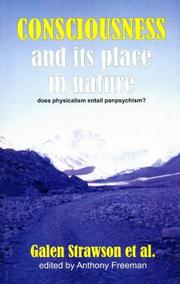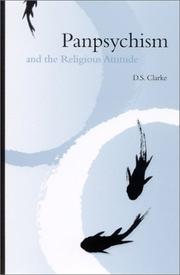| Listing 1 - 10 of 27 | << page >> |
Sort by
|
Book
Year: 2005 Publisher: Cambridge (Mass.) : MIT press,
Abstract | Keywords | Export | Availability | Bookmark
 Loading...
Loading...Choose an application
- Reference Manager
- EndNote
- RefWorks (Direct export to RefWorks)
Panpsychism --- History.
Book
ISBN: 9781788360876 1788360877 Year: 2022 Publisher: [Place of publication not identified] : Imprint Academic,
Abstract | Keywords | Export | Availability | Bookmark
 Loading...
Loading...Choose an application
- Reference Manager
- EndNote
- RefWorks (Direct export to RefWorks)
Book
ISBN: 9781138817135 Year: 2020 Publisher: New York : Routledge,
Abstract | Keywords | Export | Availability | Bookmark
 Loading...
Loading...Choose an application
- Reference Manager
- EndNote
- RefWorks (Direct export to RefWorks)
Panpsychism is the view that consciousness – the most puzzling and strangest phenomenon in the entire universe – is a fundamental and ubiquitous feature of the world, though in a form very remote from human consciousness. At a very basic level, the world is awake. Panpsychism seems implausible to most, and yet it has experienced a remarkable renaissance of interest over the last quarter century. The reason is the stubbornly intractable problem of consciousness. Despite immense progress in understanding the brain and its relation to states of consciousness, we still really have no idea how consciousness emerges from physical processes which are presumed to be entirely non-conscious.The Routledge Handbook of Panpsychism provides a high-level comprehensive examination and assessment of the subject – its history and contemporary development. It offers 28 chapters, appearing in print here for the first time, from the world’s leading researchers on panpsychism. The chapters are divided into four sections that integrate panpsychism’s relevance with important issues in philosophy of mind, philosophy of science, metaphysics, and even ethics:Historical ReflectionsForms of PanpsychismComparative AlternativesHow Does Panpsychism Work?The volume will be useful to students and scholars as both an introduction and as cutting-edge philosophical engagement with the subject. For anyone interested in a philosophical approach to panpsychism, the Handbook will supply fascinating and enlightening reading. The topics covered are highly diverse, representing a spectrum of views on the nature of mind and world from various standpoints which take panpsychism seriously.scious.
Book
ISBN: 9782252039120 Year: 2013 Publisher: Paris : Klincksieck,
Abstract | Keywords | Export | Availability | Bookmark
 Loading...
Loading...Choose an application
- Reference Manager
- EndNote
- RefWorks (Direct export to RefWorks)
Panpsychism. --- God. --- Panpsychisme --- Dieu
Book
ISBN: 3969751438 Year: 2011 Publisher: Paderborn : mentis Verlag,
Abstract | Keywords | Export | Availability | Bookmark
 Loading...
Loading...Choose an application
- Reference Manager
- EndNote
- RefWorks (Direct export to RefWorks)
Die Probleme der reduktiv-physikalistischen Ansätze in der Geist-Gehirn-Debatte führten zu einer Renaissance von Ansätzen, die man als nicht-reduktive Theorien bezeichnen kann. Darunter auch der sogenannte Panpsychismus, der in jüngster Vergangenheit einige prominente Fürsprecher gewinnen konnte. Zwar gibt es innerhalb des Panpsychismus verschiedene Strömungen, gemeinsam ist diesen Positionen, dass sie Vorstufen von Erfahrungsfähigkeit für alle Entitäten des Universums behaupten. Obwohl diese Position eine lange philosophiegeschichtliche Tradition hat, ist sie erst in den letzten Jahren wieder durch Veröffentlichungen von David Chalmers, Galen Strawson und Gregg Rosenberg in die Diskussion gebracht worden, die nun auch im deutschsprachigen Raum intensiver geführt wird. Der Band versteht sich als kritische Ein- und Weiterführung der aktuellen Debatte. Aus diesem Grund sind dort Beiträge versammelt, in denen die Hauptargumente und -begriffe dieser Position analysiert werden: So wird in die Debatte eingeführt, und Implikationen und Weiterführungen können kritisch diskutiert werden. Gemäß dieser Intention gliedert sich der Band in drei Teile: Im ersten Teil werden grundlegende Konzepte und Argumente vorgestellt, so dass der Leser einen Überblick über die Geschichte, Begriffe und aktuelle Debatte erhält. Im zweiten Teil wird der Erklärungswert des Panpsychismus mit konkreten Einzelwissenschaften in Verbindung gebracht. Im dritten Teil werden dann noch einmal spezifischere Aspekte des Panpsychismus behandelt.
Book
ISBN: 9780199359943 0199359946 Year: 2017 Publisher: New York (N.Y.): Oxford university press,
Abstract | Keywords | Export | Availability | Bookmark
 Loading...
Loading...Choose an application
- Reference Manager
- EndNote
- RefWorks (Direct export to RefWorks)
Recent debates in philosophy of mind have resulted in an impasse, which lead to a renaissance of panpsychism as a viable alternative. Panpsychism is the thesis that mental being is a fundamental and ubiquitous feature of the universe. The first, systematic, state-of-the-art anthology on panpsychism. Challenges the standard physicalistic worldview. Contains original articles making exciting contributions to the academic landscape.
Book
ISBN: 3110319853 9783110319859 9783110319330 3110319330 9783868381146 3868381147 1299721524 Year: 2011 Publisher: Heusenstamm Ontos
Abstract | Keywords | Export | Availability | Bookmark
 Loading...
Loading...Choose an application
- Reference Manager
- EndNote
- RefWorks (Direct export to RefWorks)
A revival of panpsychistic considerations of the mind's place in nature has recently enriched the debate on the mind-body problem in contemporary philosophy of mind. The essays assembled in the present collection aim to supply a positive contribution to these considerations, providing new perspectives on panpsychism by shedding new light on its arguments and impacts as well as on its problems and theoretical challenges. Panpsychism is discussed as a position that understands consciousness as a truly fundamental feature of our reality - not only with respect to the human species, but also with respect to the evolution of the universe as such.
Panpsychism. --- Animism --- Consciousness --- Philosophy --- Hylozoism --- Philosophical anthropology

ISBN: 9781845400590 1845400593 Year: 2006 Publisher: Exeter, UK ; Charlottesville, Va. : Imprint Academic,
Abstract | Keywords | Export | Availability | Bookmark
 Loading...
Loading...Choose an application
- Reference Manager
- EndNote
- RefWorks (Direct export to RefWorks)
For the last five years philosopher Galen Strawson has provoked a mixture of shock and scepticism with his carefully argued case that physicalism (the view that every real, concrete phenomenon in the universe is physical) entails panpsychism (the view that the existence of every real concrete thing involves experiential being). In this book Strawson provides the fullest and most careful statement of his position to date, throwing down the gauntlet to his critics ― including Peter Carruthers, Frank Jackson, David Rosenthal and J.J.C. Smart ― by inviting them to respond in print. The book concludes with Strawson's response to his commentators.
Panpsychism. --- Consciousness. --- Materialism. --- Philosophy of mind.

ISBN: 0791456862 0791456854 Year: 2003
Abstract | Keywords | Export | Availability | Bookmark
 Loading...
Loading...Choose an application
- Reference Manager
- EndNote
- RefWorks (Direct export to RefWorks)
Panpsychism. --- Panpsychism --- 141.141 --- Animism --- Consciousness --- Philosophy --- Hylozoism --- 141.141 Animisme. Panpsychisme --- Animisme. Panpsychisme
Book
ISBN: 9780190859053 9780190859084 0190859083 0190859067 0190859059 Year: 2019 Publisher: New York, N.Y. Oxford University Press
Abstract | Keywords | Export | Availability | Bookmark
 Loading...
Loading...Choose an application
- Reference Manager
- EndNote
- RefWorks (Direct export to RefWorks)
This book explores a neglected philosophical question: How do groups of interacting minds relate to singular minds? Could several of us, by organizing ourselves the right way, constitute a single conscious mind that contains our minds as parts? And could each of us have been, all along, a group of mental parts in close cooperation? Scientific progress seems to be slowly revealing that all the different physical objects around us are, at root, just a matter of the right parts put together in the right ways: How far could the same be true of minds? This book argues that we are too used to seeing the mind as an indivisible unity and that understanding our place in nature requires being willing to see minds as composite systems, simultaneously one conscious whole and many conscious parts. In thinking through the implications of such a shift of perspective, the book relates the question of mental combination to a range of different theories of the mind (in particular panpsychism, functionalism, and Neo-Lockeanism about personal identity) and identifies, clarifies, and addresses a wide array of philosophical objections (concerning personal identity, the unity of consciousness, the privacy of experience, and other issues) that have been raised against the idea of composite minds. The result is an account of the metaphysics of composition and consciousness that can illuminate many different debates in philosophy of mind, concerning split brains, collective intentionality, and the combination problem, among others.--publisher.
Philosophical anthropology --- Theory of knowledge --- Panpsychism. --- Subjectivity. --- Consciousness. --- Metaphysics.
| Listing 1 - 10 of 27 | << page >> |
Sort by
|

 Search
Search Feedback
Feedback About UniCat
About UniCat  Help
Help News
News